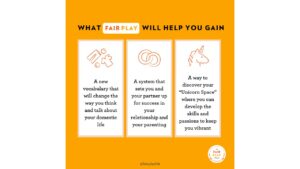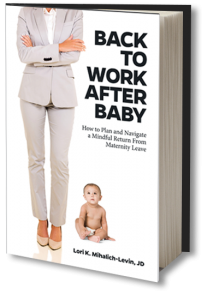 Do you ever feel stuck when thinking about how you divide household labor with your partner? It’s a topic that is (fortunately) getting more airtime these days on social media and in the press. But who does what at home is a complex and layered issue. And it can sometimes be hard to know where to start in kicking off conversations with your partner.
Do you ever feel stuck when thinking about how you divide household labor with your partner? It’s a topic that is (fortunately) getting more airtime these days on social media and in the press. But who does what at home is a complex and layered issue. And it can sometimes be hard to know where to start in kicking off conversations with your partner.
If you’ve hung out around Mindful Return for a while, you know I’m a fan of Eve Rodsky’s Fair Play book and system. But what if you feel overwhelmed just by the thought of reading a book? Or implementing a “system”?
My fellow Certified Fair Play Facilitator, Alyssa Goodman, is here today on the blog to share some wisdom on how exactly to take those first steps. It’s easy to get stuck when thinking about what to do (or say!) first, and then next, and then next. Alyssa’s here to get you – and your partner – unstuck.
Need someone to hold your hand through the process? Alyssa also has a very limited number (5) of coaching spots open for Mindful Return readers, which you can apply for below.
Now, here’s Alyssa.
************************************
 When a couple welcomes a baby into their family, there is often a shift in the division of household labor between the parents. This work most often falls inequitably on the mother/birthing individual in cis-gender/heterosexual couples. There are also often shifts in this division when one or both parents return to work outside of the home.
When a couple welcomes a baby into their family, there is often a shift in the division of household labor between the parents. This work most often falls inequitably on the mother/birthing individual in cis-gender/heterosexual couples. There are also often shifts in this division when one or both parents return to work outside of the home.
Fair Play is a great resource for partners and parents to think about how to start (or improve upon) the conversations about working together to divide up the household labor in a more equitable manner. You may have read Eve Rodsky’s book, Fair Play: A Game-Changing Solution for When You Have Too Much to Do (and More Life to Live). Or perhaps you read Lori’s blog about the household division of labor. Perhaps you’ve watched the Fair Play documentary that Lori highlighted back on August 20, 2022. In the book and documentary, Eve outlines the key elements of the Fair Play Method: boundaries, systems, and communication.
- Boundaries: Boundaries include the idea that everyone’s time has the same value. Everyone has 24 hours in one day. Rather than viewing men’s time as finite and women’s time as infinite, it’s essential that we all shift our mindset to one in which everyone’s time is equal and valued.
- Systems: In the Fair Play Method, Eve offers couples a framework to put in place when tackling all of the household labor. This framework is: Conception, Planning, and Execution (or CPE). This system identifies the three key parts of a task, including the invisible labor (conception, planning) that often aren’t addressed and seen in the same way by both partners. This is an essential part of the Fair Play Method and, when discussed and implemented well, the CPE structure allows one partner to take full ownership over a task.
- Communication: Communication is essential in the Fair Play Method. Making the time to communicate and practicing how to effectively communicate with one another is a priority. This includes a regular check-in. It’s important to create a time and space when partners can come together to discuss what’s going well, what’s been challenging, and how they will work together on dividing up the Fair Play deck of cards moving forward. Rather than giving feedback in the heat of the moment, Eve suggests bringing it to the regular check-in. At a scheduled meeting, cognition is higher, and emotions are lower.
Many will get started on this path, with the best of intentions and ready to jump in. But then they get stuck. Perhaps it’s the busyness of life. Or the feeling like they can’t slow down. Or maybe the uncertainty about how to best bring this up with a partner. Regardless of the reason, it can be hard to get started and build momentum in this work.

My partner and I wanted to put our own personal spin on the regular check-in process, so we considered what could help make our weekly meetings something we look forward to. My partner came up with the idea of playing a record during our check-in time.
While listening to Side A of the record, we share gratitude for each other, our wins from the week, and what is coming up from a scheduling/logistical standpoint. On Side B, we dig deeper into a Fair Play card. This includes feedback on what worked well and what was challenging in the past week. Creating this time in a way that worked specifically for us has changed the game. We hold this time every week, now. We enjoy picking out the record together (along with some sweet treats and tea).
Read on for tips for getting unstuck, including a Fair Play coaching opportunity!
Consider your why. Why are you wanting to implement Fair Play right now? How will this help you?
Perhaps it will help lessen the resentment you may feel toward your partner. Or it will free up your time and mental space to explore an interest of yours. (Your “unicorn space,” as Eve Rodsky calls it). Or you want to be a better model for your children. Perhaps you want to show them how you and your partner work together in an equitable way at home. Whatever your “why” is, it’s important to start there and be able to name it for yourself and your partner. Remember to also ask your partner about their “why.”
Start small. Changes will likely not come overnight, but rather in the small steps that it takes to build a new rhythm and routine. One conversation, one card at a time.
Your first step can be scheduling a 5-10 minute check-in each day. Or perhaps a 30-45 minute check-in each week. Get it on the calendar. Stick to it. As you’re building in this new check-in time, focus on building positive momentum. Getting into the rhythm of having these regular conversations is an essential first step. Once this rhythm is established, the next small step can be adding in 1 card per check-in. You don’t need to tackle all 100 cards at once. (And really, we advise against that!)
Remind yourself you and your partner are on the same team. It may not always feel this way, especially when cognition may be low and emotions are high.
Remind yourselves, though, that you are on the same team. Small shifts like sitting on the same side of the table when looking at the cards and having these discussions can make a big difference.
Start with gratitude. Partners who initially start with Fair Play are often looking for a system, because they’ve felt things haven’t been equitable and they are wanting a change – fast.
With this intention for speed, check-ins can quickly become a logistical touchpoint. You can wind up focusing on the technical aspects of running a household. While these details are important, it’s also essential to create space for sharing gratitude with one another. Remember to talk about what is going well.
Interested in receiving additional 1-1 support to implement a Fair Play system with your partner? Apply for a Fair Play Coaching session! Given the limited number of available sessions (there are 5 available to the Mindful Return community), we request that you complete this 5-10 minute application so that we can select those that would be the best fit for this offering.
 Alyssa Goodman, MSW, LMSW/LGSW, PMH-C, is a former educator and operations specialist turned perinatal social worker and Certified Fair Play Facilitator. She has spent the last 15 years supporting children and families in a variety of settings. Alyssa now focuses on supporting partners and parents through the perinatal phase and as they rebalance the domestic labor in their home. As a Certified Fair Play Facilitator, Alyssa offers coaching, workshops, and retreats on the Fair Play Method, a game-changing system that helps rebalance the domestic responsibilities and mental load.
Alyssa Goodman, MSW, LMSW/LGSW, PMH-C, is a former educator and operations specialist turned perinatal social worker and Certified Fair Play Facilitator. She has spent the last 15 years supporting children and families in a variety of settings. Alyssa now focuses on supporting partners and parents through the perinatal phase and as they rebalance the domestic labor in their home. As a Certified Fair Play Facilitator, Alyssa offers coaching, workshops, and retreats on the Fair Play Method, a game-changing system that helps rebalance the domestic responsibilities and mental load.
Want more practical tips on working parenthood? Check out my book, Back to Work After Baby: How to Plan and Navigate a Mindful Return from Maternity Leave



